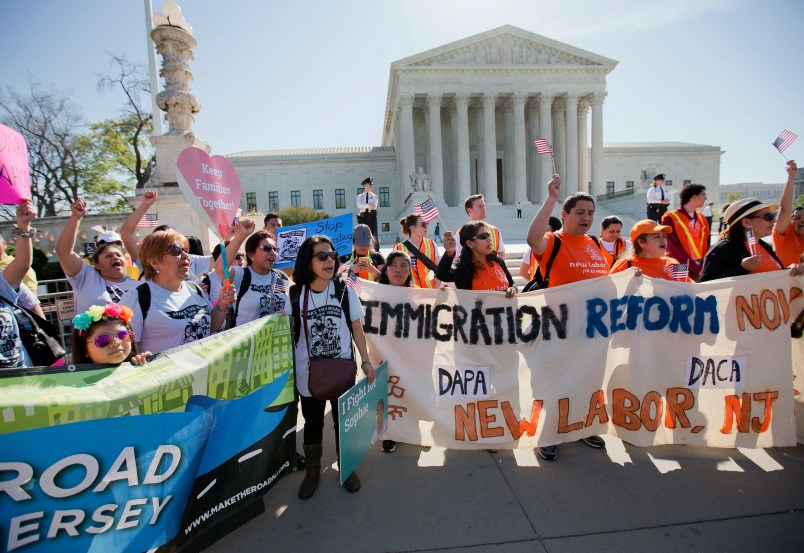The Supreme Court split four-four on a challenge to the President Obama’s immigration executive action. The tie vote means that the appeals court decision blocking implementation of the program will be allowed stand.
The decision is not a full opinion but just a one sentence line that says “the judgment is affirmed by an equally divided Court.” The fate of the President’s immigration programs will likely hinge on the next election.
The lawsuit, U.S. v. Texas, had been brought by 26 red states led by Texas. They objected to Obama administration’s 2014 executive actions that could have shielded millions of undocumented immigrants from deportation. The states argued that the actions violated regulatory protocol, statute and the Constitution. The executive action in question was Department of Homeland Security memo that expanded the “DACA” program — which grants deportation relief to certain undocumented immigrants brought to the country as minors– and that created the program known as “DAPA,” which shields from deportation the undocumented parents of citizens and residents with legal status.
A conservative judge in Texas blocked the programs just before they were set to go into effect in 2015. The 5th Circuit Court of Appeals upheld his injunction, and the Obama administration appealed the case to the Supreme Court, which heard it in April.
Legal observers were surprised initially when the district court judge, Judge Andrew Hanen, placed a nationwide injunction on the program, an injunction that was upheld by the 5th U.S. Circuit Court of Appeals. Going forward, it is unclear whether the injunction will continue to apply nationwide or if the administration will seek to implement the program outside the 5th Circuit. When the Supreme Court is split on an issue, no national precedent is set.
Immigration advocates had hoped to win Chief Justice John Roberts to their side with the argument that the states did not have the standing to bring the lawsuit in the first place. In oral arguments, however, the justice did not to seem too eager to engage in the issue.
Texas Attorney General Ken Paxton issued a statement celebrating the ruling.
“Today’s decision keeps in place what we have maintained from the very start: one person, even a president, cannot unilaterally change the law. This is a major setback to President Obama’s attempts to expand executive power, and a victory for those who believe in the separation of powers and the rule of law,” he said.
President Obama expressed disappointment in the decision in remarks delivered from the White House briefing room.
“The fact that the Supreme Court wasn’t able to issue a decision today doesn’t just set the system back further, it takes us further from the country that we aspire to be,” he said.







This is unfortunate. These people will still be in “limbo.”
Paxton is a dipshit, and an asshole who should be in jail.
Once again, Texas does their best to fuck up the world for everyone else.
“a victory for those who believe in the separation of powers and the rule of law,”
You mean rules of law like the Advice and Consent Subclause of the Appointments Clause? I think not.
He conveniently would like to ignore the law that he personally violated on the principle that IOKIYAR
Yeah, the “unelected activist judges!” tirade was quickly trashed.